Joaquin Phoenix's Joker: Will Gompertz reviews the film about Batman's arch-enemy ★★★★☆
- Published
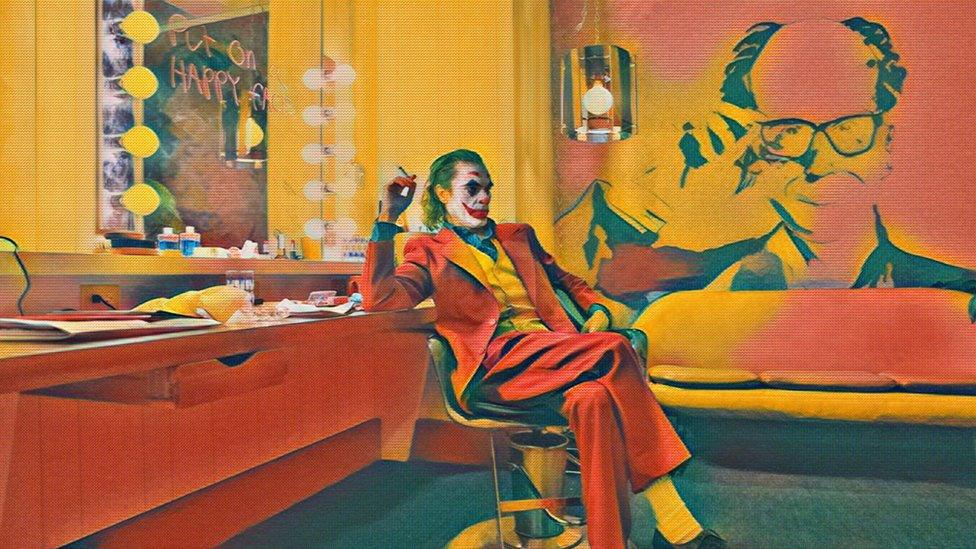
They say people only go to the movies nowadays to see all-singing-all-dancing multi-million-dollar, computer-enhanced Hollywood franchises. They say there's no money to be made anymore with serious, gritty dramas. They say, that's what box sets on streaming services are for. The golden days of cinema are over. They say.
They say that.
But then they haven't seen Joker, the origin story of Batman's arch-enemy, co-written and directed by Todd Phillips. Sure, it might sound like another of those action-packed, special effects-laden fantasy epics that overshadow all else. It might even be what the folk who go to see it expect.
But Joker has about as much in common with your typical superhero caper as Wonder Woman has with Dennis the Menace.
Joker is a Trojan Horse: a dark art house film smuggled into the neon-lit world of multiplexes, disguised as a DC Comic Universe action adventure.
It's an interesting move by Warner Brothers. The studio knows audiences love "Thwack!", "Pow!" action sequences; that they expect witty dialogue and plenty of banter, and CGI is a given.
Well, there's none of that in Joker.
Instead you have Joaquin Phoenix giving it the full Daniel Day-Lewis in a slow-burn performance of such intensity and weirdness, it will either have the Academy purring come the Oscars or shunning altogether.
It worked for me.
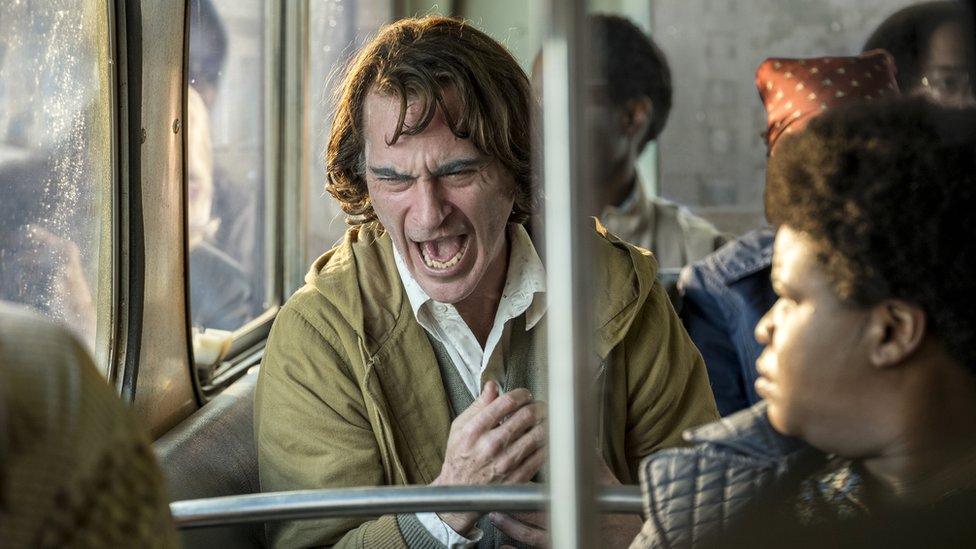
Joaquin Phoenix as Arthur Fleck, a "misunderstood man whom life is repeatedly beating down"
Phoenix plays misfit Arthur Fleck, a man who hasn't exactly run out of luck, because he never had any in the first place. From an early age Arthur has suffered from a neurological condition that causes him to laugh like a hyena at the most inappropriate moments. Not a fun infectious laugh, but a laugh so dry and hard it makes him retch and everybody else feel nauseous.
And then there is his mother (Frances Conroy) whom he loves and who loves him, but… well, as I said, he's not a lucky guy.
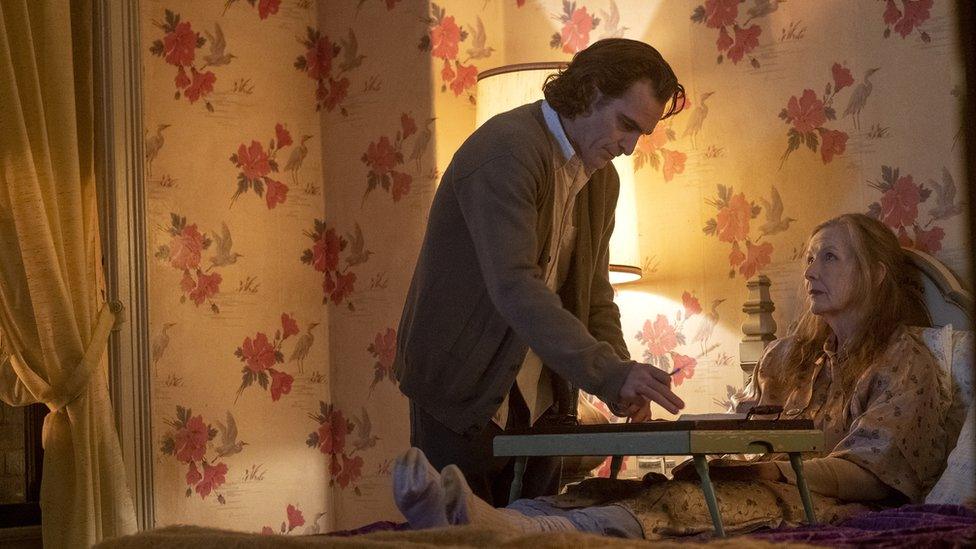
Arthur cares for his frail mother, Penny (played by Frances Conroy)
Arthur Fleck is an oddball in a cruel, intolerant world that doesn't have time to care for vulnerable people.
He lives in a Gotham City that's gone to the dogs: uncollected garbage bags pile up like stinking black skyscrapers, welfare budgets have been slashed, and mass civil unrest is one small trigger-point from becoming a reality.
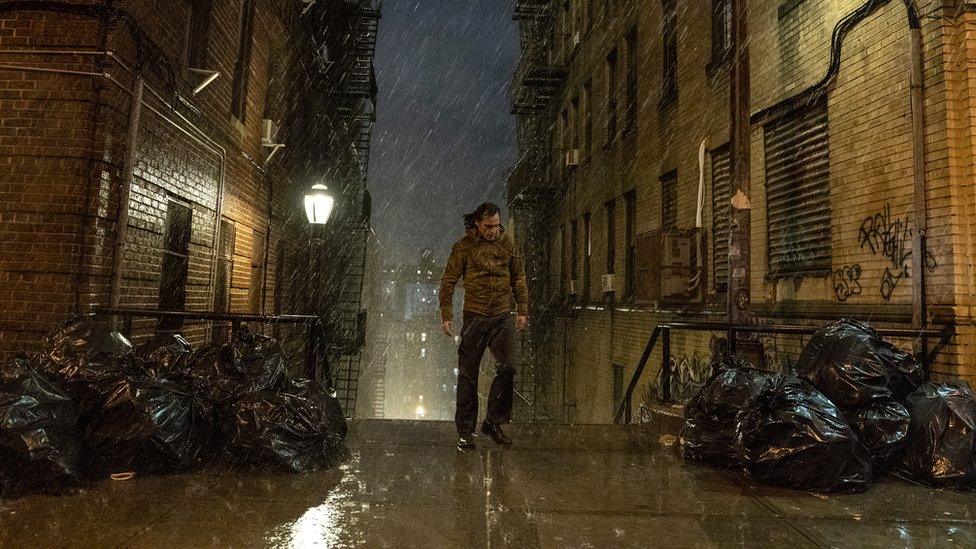
Arthur is trying to find his way in a Gotham City, which is in turmoil and struggling to provide services for its people
If Arthur were sensible he'd take an admin job in a library and keep his head down. But Arthur isn't sensible, he's delusional and therefore makes choices that are not good for him or anyone else.
He's a chap who wants to put a smile on people's faces, and so he becomes a clown-for-hire during the day and an amateur stand-up comic at night.
There is not a career adviser on the planet who would have pushed him in that direction.
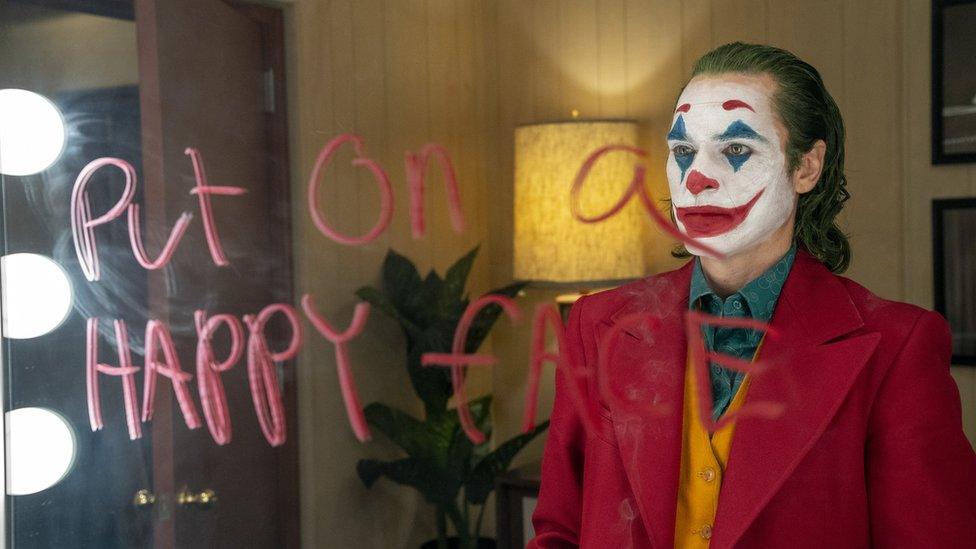
Joaquin Phoenix said at times he "understood the Joker's motivation", but would then be "repulsed" by his decisions
Phoenix plays Arthur's tragic descent in a way which seemingly encourages our empathy but makes sure he never really gets it: we know he's not a character to whom you'd want to get too close. There is a maniacal darkness behind his eyes which is a bit creepy.
His only pleasure comes from watching Murray Franklin's chat show, on to which he dreams of being invited one day. Robert De Niro plays the legendary TV host, thereby reversing the role he played as Rupert Pupkin in The King of Comedy, a film to which Joker owes a debt (as well as Psycho and Taxi Driver).

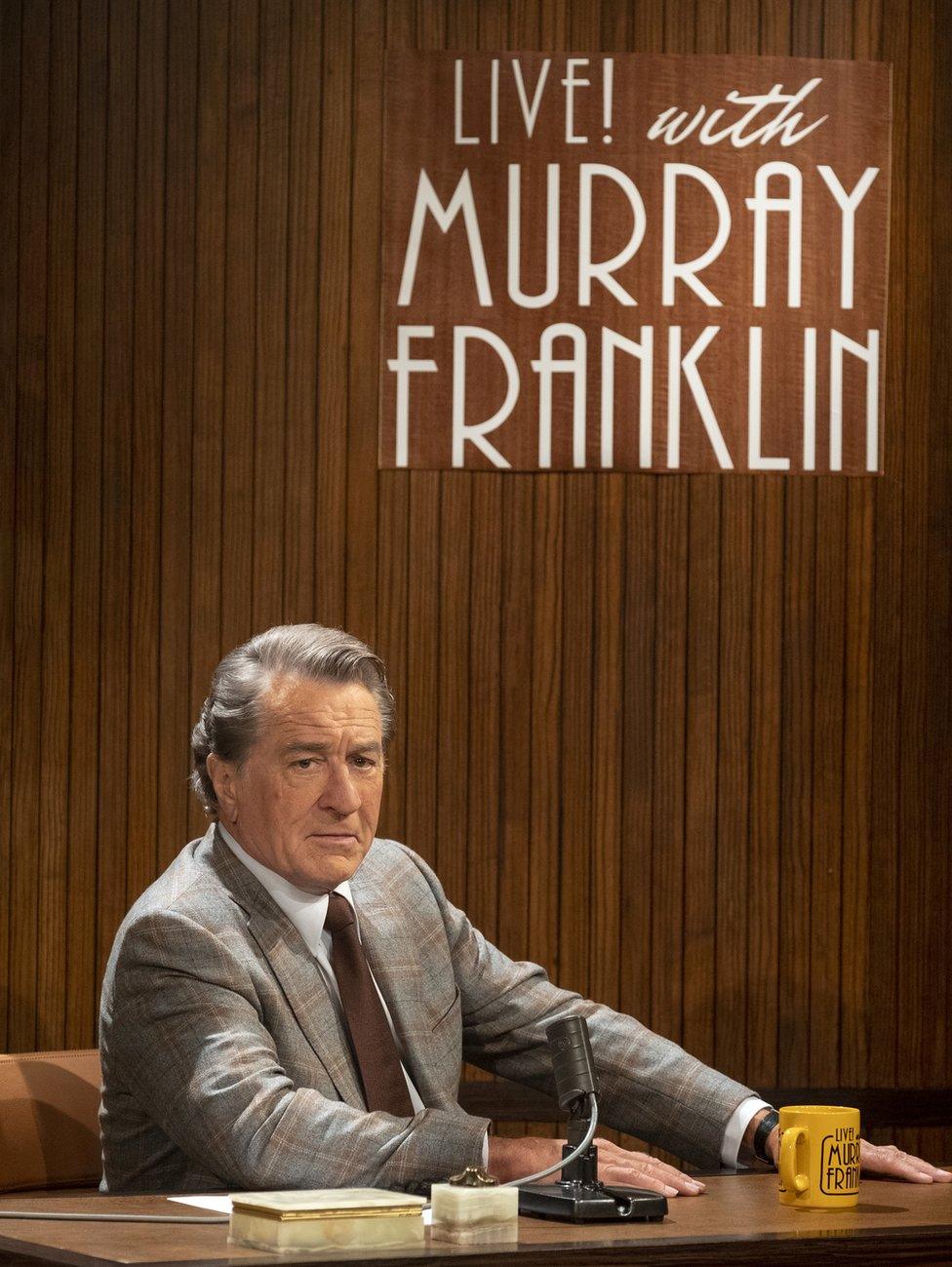
Robert De Niro plays Murray Franklin, an amalgam of real-life chat show hosts including Johnny Carson

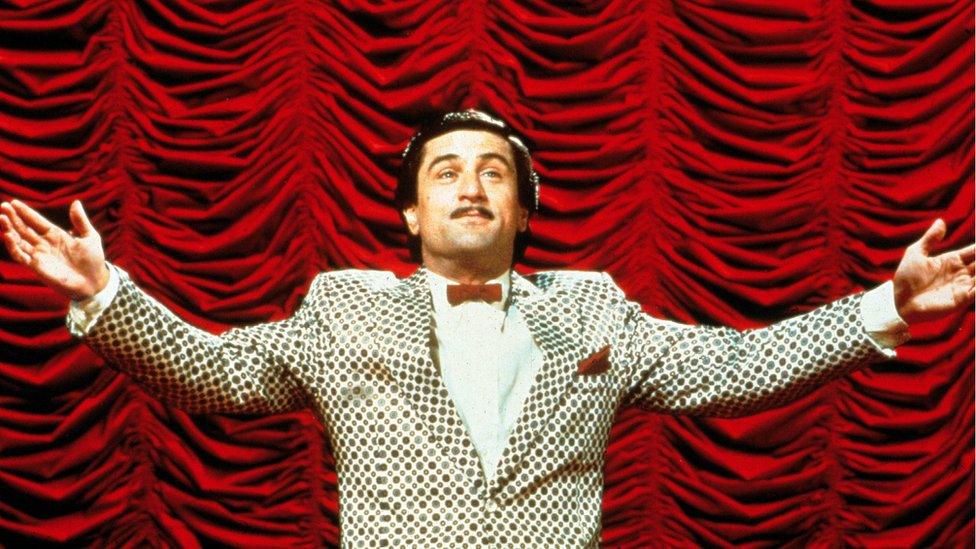
Robert de Niro as Rupert Pupkin in Martin Scorsese's film, The King of Comedy, which influenced Todd Phillips
Everything about the film is downbeat.
The sun never shines in this Gotham City.
Class war simmers while the media crank up the tension with inflammatory headlines and irresponsible TV shows that give airtime to the wrong people for the wrong reasons. The elite live in a pampered bubble without a care in the world, wilfully ignorant of the hardships other folk suffer. It might be set in the early 1980s, but it is clearly a parable about the here and now.
Joker is a powerful film.
It is several galaxies away from a piece of light comic entertainment with cartoon violence and clever sight gags. There are no laughs in this tale about a man who wants to be funny.
It is a heavy, serious and, at times, a painfully slow piece: Beckettian almost.
It is not perfect.
Several of the minor supporting characters are too thinly drawn to allow them to be anything more than "types." And you might want to challenge some of the assumptions and conclusions it makes around issues of mental health right down to its central question: what turns someone like Arthur into the Joker?
The violence is bloody and hard to watch, but valid in terms of context and mood.
I say this because Joker is a film that not only raises the issue of a culture in which there is wide accessibility to firearms, but also because it sits within a franchise that tragically became associated with the real-life consequences of gun crime. In 2012 James Holmes killed 12 people and injured dozens more at the midnight premier of The Dark Knight Rises in Aurora, Colorado.

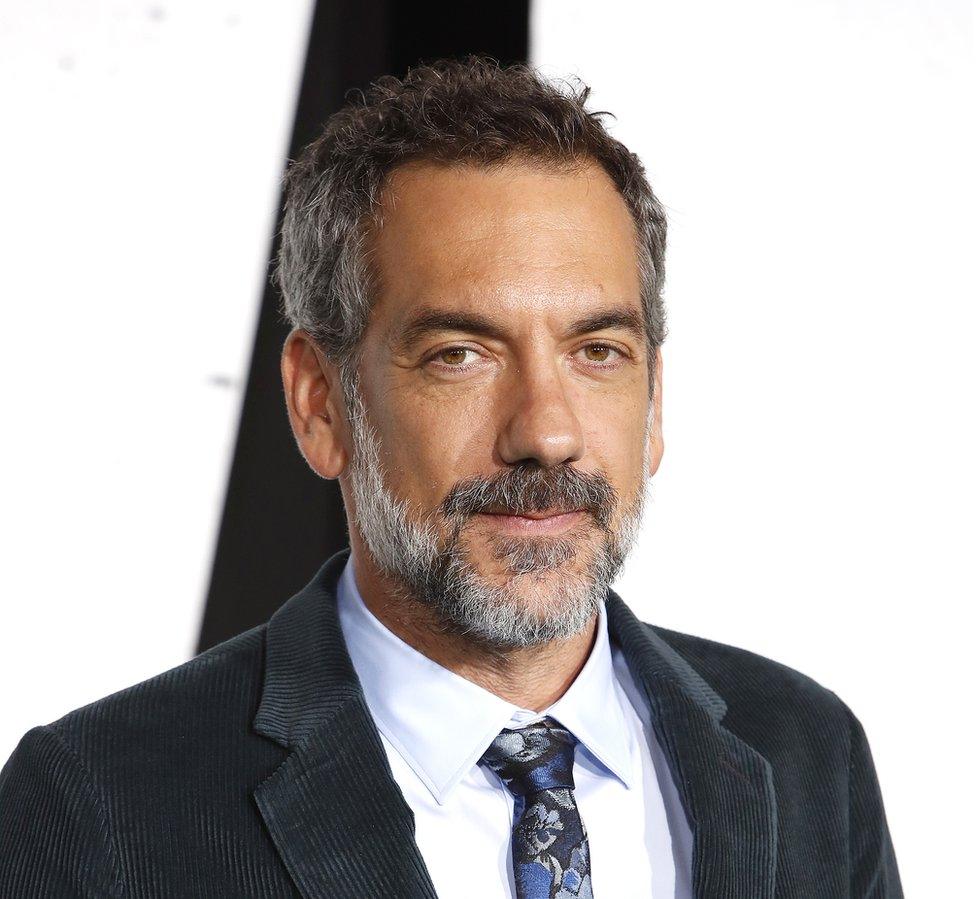
Joker's director Todd Phillips responded to concerns that the film is too violent, by asking "Isn't it a good thing to put real-world implications on violence?"

The conversation about art and life and the relationship between the two is ancient and modern. It will and should continue.
I didn't think Joker was flippant or indulgent. Nor do I think it is encouraging or inciting violence.
It is reflecting on it, which art is there to do.
My only reservation was the 15 certificate, given the graphic nature of some scenes in a genre when parents might be expecting a more slapstick approach.
I've seen a lot of yellow-toothed Jokers in my life, from Cesar Romero to Heath Ledger. They've all brought something to the part but none gave the character the fragility and psychosis of Joaquin Phoenix's desperate and desperately sad Joker.
I think it will become a classic.
Recent reviews by Will Gompertz
Follow Will Gompertz on Twitter, external
